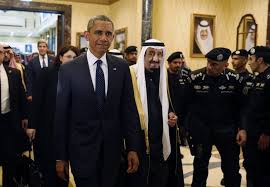At the invitation of King Salman bin Abdulaziz, heads of State and Governments of the Gulf Cooperation Council (GCC) members and the United States convened Thursday in Riyadh, as a step to reaffirm the GCC-US strategic partnership in pursuit of a stable, secure and prosperous region.
After meeting heads of Gulf States, U.S. President Barack Obama wrapped up his two-day and final visit -before he leaves office- to the Kingdom, before taking off to London.
The leaders discussed the importance of stabilizing the region and addressing the most pressing conflicts. They also reiterated the decisions reached at the Camp David summit, which was held last May in Washington D.C., underscoring the need to solidify gains.
Obama concluded the meeting while confirming the United States’ commitment to deter and confront aggression against Gulf Arab monarchies, especially with Iran’s threats prevailing in the region.
Obama came to Saudi Arabia hoping to relieve Gulf States’ fears over Iranian influence and encourage them to douse sectarian tensions in an effort to confront the threat posed by jihadist militants like ISIS.
“I reaffirmed the policy of the United States to use all elements of our power to secure our core interests in the Gulf region and to deter and confront external aggression against our allies and our partners,” he said in Riyadh on Thursday after the summit with the Gulf Cooperation Council (GCC).
“Even with the nuclear deal we recognize collectively that we continue to have serious concerns about Iranian behavior,” he said.
GCC Leaders and Obama reaffirmed the need to remain vigilant about dealing with Iran’s destabilizing actions in the region, including its ballistic missile program and backing for terrorist groups such as the Lebanon-based Hezbollah and other extremist proxies in Syria, Yemen and elsewhere. In light of these activities, leaders attending the summit pledged to increase information sharing on Iran and other threats facing the region.
The GCC leaders assured their willingness to engage with Iran and resolve longstanding differences, on condition that Iran acts according to principles of good neighborliness, strict non-interference in domestic affairs and respect for territorial integrity, in accordance with international law, including the United Nations Charter.
There was no denying the strains that have afflicted ties between Washington and its Gulf partners, though, even as they have worked together on shared concerns such as the wars in Syria, Iraq and Yemen, however.
The summit also tackled regional issues, namely the situation in Syria, Iraq, Palestine, Yemen and Libya. The leaders expressed solidarity with the Syrian people, and underscored the need of sticking to the ceasefire and ensuring humanitarian access to besieged areas. They also reaffirmed the need of a political transition that excludes Bashar Assad and preserves state institutions.
As for the situation in Iraq, the leaders hailed the progress achieved in ridding of sectarian tensions and endorsing reconciliation among all Iraqis. The leaders vowed to ramp up the fight against ISIL (another acronym for ISIS) and to maximize efforts aiming at ensuring stability to areas freed from the terrorist organization.
Deliberating on Yemen, the leaders welcomed the cessation of hostilities, calling on all parties to abide by it and attend the peace talks held in Kuwait. The leaders also expressed continued support for U.N. envoy Ismail Ould Cheikh Ahmed’s work, pushing for durable, inclusive political settlement of the conflict.
The GCC and the United States also accentuated the importance of resolving the Israeli-Palestinian conflict in a just peace agreement that guarantees the sovereignty of two states living side by side.
Regarding Libya, the leaders welcomed the recent seating of the Government of National Accord in Tripoli, saying that respecting the government’s authority and legitimacy helps the country in overcoming obstacles and reaching a prosperous future.
Terrorism also had its share in the summit, as leaders restated their utter commitment to fight terrorism in all of its forms. Both the GCC and the U.S. hailed the significant advancement achieved against ISIL in Syria and Iraq. The leaders accentuated the importance of unified actions against the terrorist threat, pledging more reinforcement to their counterterrorism partnership. The United States welcomed GCC members’ participation in the international coalition against ISIL and commended their arduous efforts spent to thwart terrorist attacks.
During the summit, GCC leaders expressed their desire to open an office in Washington to advance cooperation; a step that the U.S. welcomed, stressing the crucial importance of an enduring GCC-U.S. partnership in order to promote peace, stability and security in the region.
